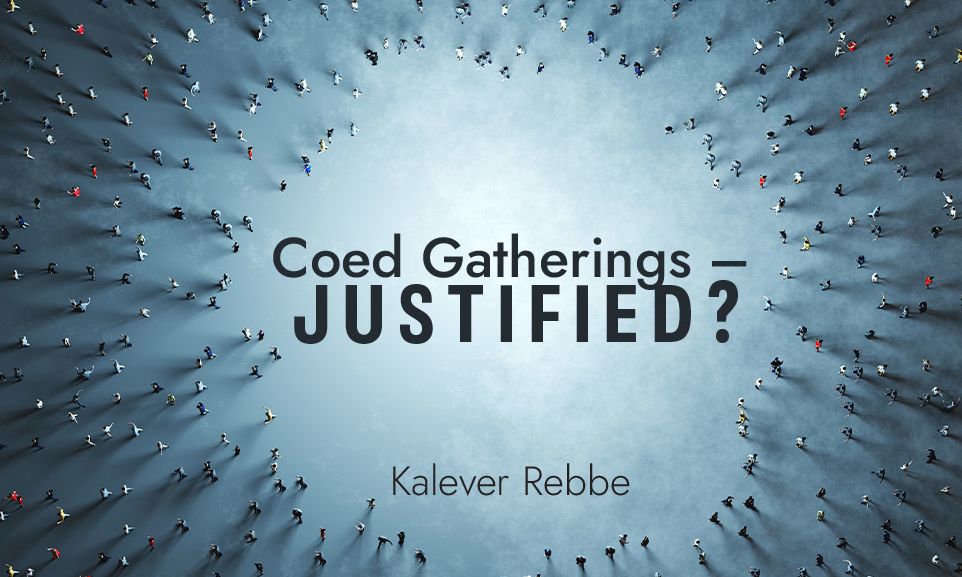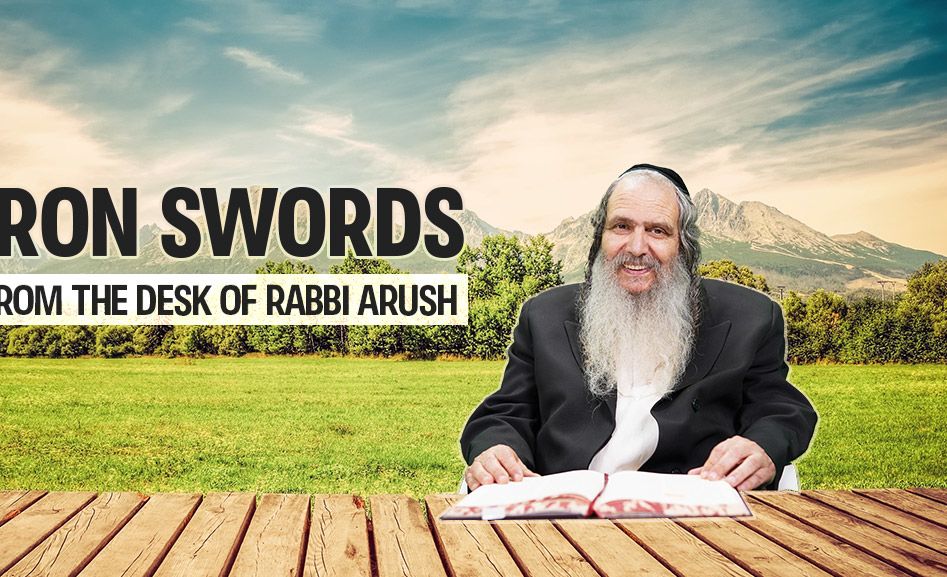
Coed Gatherings – Justified?
The laws that prevent men and women from fraternizing together are very serious and cannot be ignored for the sake of a mitzvah.

“You shall keep My Sabbaths and fear My Sanctuary. I am the Lord”. (Vayikra 26:2)
The laws that prevent men and women from fraternizing together, are extremely serious, and they cannot be taken lightly. However, there are many people who mistakenly think that those laws can be ignored for the sake of a mitzvah, for example at a fundraiser, a wedding, or at Shabbat and Yom Tov meals and events. They feel that the “end justifies the means.”
However, this is blatantly not a Jewish concept. For example, a Jew cannot steal matzah to fulfill the mitzvah. Even though it was stolen for a mitzvah, that mitzvah that was performed with matzah acquired through thievery is disgraceful in Hashem’s eyes. So too, every mitzvah that is done while discarding the laws of tzniut and the safeguards that were created to avoid promiscuous behavior, is equally disgraceful to Hashem.
Proper Contributions
R’ Elchanan Wasserman, zt”l, came to America to raise funds for his yeshiva. There was an affluent philanthropist who had an idea of hosting a large party with music and mixed dancing and all of the proceeds would go to the yeshiva. They showed R’ Elchanan the tickets that were printed for the proposed party and told him that a significant amount of money would be raised at the event. He said, “You cannot build a Torah from the proceeds of an event like this!” He then tore up all of the tickets.
When R’ Menachem Mendel from Vishavo, zt”l, was raising money in America for his yeshiva, he was invited to Detroit for a community fundraiser that guaranteed $5,000, which was a significant amount of money in those days. When he came to the event, he was shocked to see men and women sitting together at the tables.
He remained standing in the doorway and he said:
“When Moshe Rabbeinu erected the Mishkan (Tabernacle in the desert) he invited the entire Jewish nation to come and contribute to the effort. The pasuk tells us (Shemos 35:22), “The men came with the women… ” They all came together. When Moshe saw this, he commanded (Shemos 36:6), “Let no man or woman do any more work for the offering for the Holy.” So, the people stopped bringing”. It was not pleasing to Hashem that the Mishkan should be built with donations from a coed gathering. The people stopped bringing their contributions because their Rabbi would prefer that they offer nothing rather than donate in a coed venue.”
R’ Menachem Mendel continued, “The Torah testifies that even though they stopped contributing, “the work was sufficient” (Shemot 36:7). When you refuse to accept donations that were raised in an improper way, the holy work will still be completed through other means”.
Then R’ Menachem Mendel concluded: “If you agree to sit separately, I will stay. However, if you don’t, I will leave immediately and not accept a single penny from any of you.”
Promises Kept
When the Be’er Mayim Chaim became the Rav in Chernovitz, Romania, the town was full of ignorant and brazen Jews. On Shabbat, after the meals were concluded, the men and women would gather in shul to sing and dance together. They considered this “Oneg Shabbat” – enjoying Shabbat.
The Rav abolished this custom. When he arrived at shul on the first Shabbat for Minchah, someone called out, “You will suffer in your life just as you have made us suffer on Shabbat!”
When the Rav heard this, he understood the magnitude of their ignorance. He eloquently described to the congregation the importance and sanctity of Shabbat and the severity of promiscuous behavior and allowing the men and women to fraternize together. Then, the Rav promised that as long as all the men and women were separated at all the town’s events, the town would never experience a fire.
This was a profound promise. Every building in the town was constructed of extremely flammable materials like wood and straw and the town had suffered devastating fires in the past. Therefore, when they heard this promise from the Rav, they accepted his directives and made peace with it.
For 70 years, there was no fire in that town. However, there was a new generation who had only heard what a Rav had once promised. They decided to do away with the “old ways” and they began hosting Shabbat parties again where men and women sang and danced together. After the first Shabbat party, the entire city burned to the ground.
Moments of Vulnerability
The Rambam writes (Shvias Yom Tov 6:21), that the Beis Din needs to establish officers that can patrol the rivers and forest on the Yomim Tovim, to make sure that the men and women are not gathering there to eat and drink and potentially sin. They also need to warn not to host private parties in their homes where men and women would sit together and be drinking wine and behaving promiscuously. The Shulchan Aruch quotes this Rambam as the Halacha (Orach Chaim Siman 529).
The Seforim HaKedoshim explain that we need to be particularly careful with this also on every Shabbat, and whenever there is off time from work and at resorts or vacation spots. Similarly, it is critical not to send children to summer camps that are coed. The leaders of the generations have always warned us about situations that are joyous and celebratory, like Lag B’Omer celebrations, weddings etc. Whenever there is a mixed setting and socializing between men and women, the Yetzer Harah is cunningly trying to challenge you with stumbling blocks and temptations, as the Mishna Brurah describes this at length (Biur Halacha, Siman 339).
Our pasuk is warning us about this very idea:
“You shall keep My Sabbaths”…You must be careful to keep Shabbat by refraining from work and enjoying the day. However, that enjoyment requires guardrails: “and fear My Sanctuary (literally holiness)”… We need to be afraid and concerned that we might destroy the boundaries and protections that the Torah has placed upon us to protect our sanctity. We should not mistakenly think that coed events and parties are acceptable in the name of “Oneg Shabbat” or any other mitzvah.
We need to believe that our successes and the true enjoyment of life can only come when there is adherence to Torah and mitzvot and halacha. And you cannot be worried about losing out because of those restrictions. You need to believe in “I am the Lord”. He will find another way to provide like we saw in the stories above.
***
The Kalever Rebbe is the seventh Rebbe of the Kaalov Chasidic dynasty, begun by his ancestor who was born to his previously childless parents after receiving a blessing from the Baal Shem Tov zy”a, and later learned under the Maggid of Mezeritch zt”l. The Rebbe has been involved in outreach for more than 30 years and writes weekly emails on understanding current issues through the Torah. You can sign up at www.kaalov.org.








Tell us what you think!
Thank you for your comment!
It will be published after approval by the Editor.